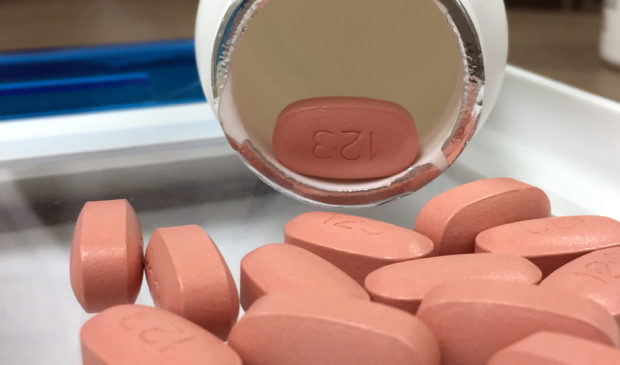Austin’s HIV Planning Council takes on an epidemic amid a pandemic
Wednesday, November 18, 2020 by
Aiden Snasdell This year has presented unique challenges to the HIV Planning Council, leading to new ways of delivering medication, virtual doctor visits and a newfound emphasis on mental health services.
The HIV Planning Council is a group of volunteers appointed by the mayor who decide the allocation of funds from the Ryan White HIV/AIDS Program, which gives the Planning Council around $5 million a year. The volunteers distribute those funds to local care facilities that provide services for HIV-positive community members, ranging from housing and food needs to medical and health services.
The Planning Council met on Sept. 28 to discuss funding allocations and send out a letter of support to care providers.
Jaseudia Killion, who coordinates the council, told the Austin Monitor that the group had discussed “extending operational hours, increasing work for purchasing additional equipment and covering utilities, housing and food.”
The most highly ranked service categories are typically outpatient medical care, oral health care and pharmaceutical assistance. However, with the outbreak of Covid-19, the needs have shifted.
Most HIV care resource centers now use telehealth programs that allow for at-home consultations, which is safer for staff and patients, but leaves many feeling isolated.
Killion said being isolated at home and unable to see their providers in person, coupled with a fear of going outside due to compromised immune systems, has had negative mental health effects within the HIV community.
“Mental health services kind of came out as something that a lot of people were saying that they needed,” Killion said.
According to a study by the Kaiser Family Foundation, in July 53 percent of adults in the United States reported that Covid had a negative impact on their mental health – a 21 percent increase from March.
The Kind Clinic is a sexual health clinic that provides HIV resources and receives funding through the Ryan White HIV/AIDS Program, other federal grants and the community. Brandon Wollerson, director of clinical operations, said the clinic has responded to mental health issues by trying to provide a constant sense of presence in the community.
“I think that the main thing is … that we’re still here and still want to be here for the community,” Wollerson said.
The Kind Clinic has hosted virtual events and online service provider meetings and launched staff and community blogs.
Holly Bullion, director of clinical quality, said that the Kind Clinic has had many more clients since the pandemic began, due to medical access changes for those with and without HIV. She explained that the clinic was quick to make accommodations.
“We acted both reactively and proactively to ensure that there wasn’t any disruption in services for our patients,” she said. “We’re just going to keep adapting, because that’s what we need to do.”
While people with compromised immune systems may not have the same immune protections as others, if they properly manage their HIV with antiretroviral therapy (ART), they do not have a higher risk of contracting Covid-19, according to the HIV/AIDS education website Avert.org.
“HIV patients are more at risk for a lot of infections if their HIV is not well-controlled; however, most patients are well-controlled and don’t tend to have additional problems with infections,” Dr. Coburn Allen, a Dell Pediatrics infectious disease and emergency medicine doctor, told the Monitor.
Allen stressed the importance of access to antiretroviral therapy for those with HIV. In the beginning of the pandemic, when nationwide lockdowns were enforced, the HIV Planning Council addressed the challenge of consistently obtaining ART.
“Another recommendation that had come out was to give people who are HIV-positive at least 60 to 90 days of their antiretroviral treatment, ART, because we didn’t know how long the lockdown would last,” Killion said.
The distribution of ART was funded by the Ryan White HIV/AIDS Program. This year, additional funding to cover Covid-related needs was granted by the CARES Act, which gave an additional $90 million to the Ryan White HIV/AIDS Program to help with the pressures of the pandemic. That money was distributed to recipient organizations across the country.
“The additional money was helpful, but it’s only so much money,” Killion said. “Ryan White is basically a payer of last resort, which means that you have to exhaust all your resources before you kind of tap into touching the Ryan White service money.”
Wollerson said that while Covid is affecting those in the HIV community, Austinites shouldn’t lose sight of the fact that there is still an HIV epidemic.
“HIV hasn’t gone away, the stigma around HIV hasn’t gone away and the need for timely access to affordable health care hasn’t gone away,” Wollerson said. “We are still here, reminding the community that it’s important to take care of your sexual health needs in addition to keeping yourself safe from Covid.”
Photo by NIAID, CC BY 2.0, via Wikimedia Commons.
This story was written by a journalism student at the University of Texas at Austin. The Austin Monitor is working in partnership with the UT School of Journalism to teach and publish stories produced by students in the City and County Government Reporting course.
The Austin Monitor’s work is made possible by donations from the community. Though our reporting covers donors from time to time, we are careful to keep business and editorial efforts separate while maintaining transparency. A complete list of donors is available here, and our code of ethics is explained here.
You're a community leader
And we’re honored you look to us for serious, in-depth news. You know a strong community needs local and dedicated watchdog reporting. We’re here for you and that won’t change. Now will you take the powerful next step and support our nonprofit news organization?










